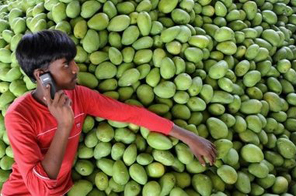India''s 3G auction set to start Friday
NEW DELHI: India's mobile firms will be bidding billions of dollars in an auction this week to provide superfast third generation (3G) service in the country's booming cellular market.
The government is hoping to reap around eight billion dollars from the sale of 3G airwaves, which begins Friday, and a follow-up auction of broadband wireless access spectrum in what will be the largest such sale in recent years.
"The major operators will bid aggressively. It will be very important for them to win 3G slots to retain their high-end subscribers," said Kunal Bajaj, managing director at telecoms consulting firm BDA Connect.
The starting price has been set at 780 million dollars for pan-India 3G licences but analysts expect the bidding to go much higher because of the scramble for spectrum in the congested market, which has over a dozen players.
"The bids should be double (the base price)," forecast Romal Shetty, executive director for telecommunications at KPMG?s Indian unit.
Nine of the cellular firms plan to bid for 3G spectrum in the world's fastest-growing mobile market.
3G allows mobile phone users to surf the Internet, video conference and download music, video and other content at a much faster pace than the current second-generation or 2G service.
Top mobile operators such as Bharti Airtel and Reliance Communications will be in the fray along with foreign-backed Vodafone Essar and Tata DoCoMo.
The addition of 3G is seen giving a major boost to a mobile market already growing by 15 to 20 million subscribers a month.
But for at least the first year, the main focus of phone companies is expected to be on improving call quality that has been affected by a spectrum crunch.
"There has been tremendous growth in the subscriber base over the past few years," said Nareshchandra Singh, analyst at international consultancy Gartner.
Mobile subscribers totalled 545 million at last count.
JPMorgan said in a report the bidding could "stretch balance sheets" of mobile companies that have already been undermined by fierce tariff battles which have reduced calling costs to less than a cent a minute and hit revenues.
India, a country of 1.2 billion people, is playing catch-up as it is the biggest major economy not to have widespread 3G services.
The country is following in the footsteps of fellow emerging market giant China, which started offering 3G services last year.
Even if India's government gets eight billion dollars for the airwaves, the sum will come nowhere near the 19 billion raised by the US government two years ago and the 35 billion earned by Britain in 2000.
Analysts say India's rural areas offer huge market potential but rolling out infrastructure to support 3G networks will be costly and the main immediate 3G battleground for customers will be in urban areas.
"It will take a couple of years for 3G to gain momentum but if someone comes up with affordable rates and affordable handsets, 3G will be very big," said Gartner's Singh.





